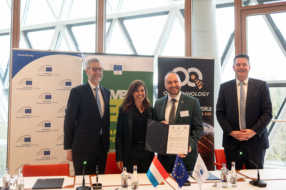The UK space sector won £844M ($1.09B) in ESA contracts between June 2022 and the end of 2024, according to new data from the UK Space Agency.
That means ESA has invested 99p into the UK space industry for every £1 the UK contributed to ESA, after overheads. While the ratio is in line with the ESA’s geo-return policy—that each member state receives the same amount of money it puts in—it hasn’t always been the case for the UK.
In 2022, the UK was receiving only 93p back in contracts for every £1 invested. Since then, the UK Space Agency has invested in programs to help its private and academic sectors apply for—and win—more ESA contracts.
Crash courses: First, the UK Space Agency identified causes for the deficit:
- The expense and time required to apply for ESA funding
- Limited awareness of the country’s contributions to specific ESA programs
- A lack of understanding within smaller UK space businesses on how to engage with ESA and put together winning proposals
The UK addressed these problems through a joint task force with ESA that made it easier for space companies to identify contract opportunities with the agency. The agency also offered bid-writing and ESA 101 workshops that assisted startups in writing successful proposals.
It seems those measures worked. The UK now has more registered entities within ESA’s procurement platform than any other country. The country’s space industry won £80M ($103.4M) in ESA contracts in Q4 2024 alone—including a €34.6M ($37.6M) contract to Open Cosmos to build three sats as part of the NanoMagSat constellation, and a €5.6M ($6.1M) contract extension to Orbex, the Scottish launcher.
“At the end of the day, this is industry and academic colleagues winning contracts in open competition,” UK Space Agency chief Paul Bate told Payload. “We have a role to play. We help with the bid writing, we help with the connections …but nonetheless, it’s our sector showing that it’s competitive.”
Shifting policies: While these improvements have beefed up returns for UK companies, not everyone is happy with the current form of geo-return, and signs point to the policy changing in the future.
A September report from the European Commission called for the geo-return policy to be scrapped, and new competitive programs, including the European Launcher Challenge, will operate outside of the geo-return framework.
From the UK’s perspective, the newfound geo-return parity is evidence of the policy’s importance.
“We have a strong relationship with ESA…It’s an even better relationship as a result of geo return improvements. There’s no doubt about that,” Bate said. “We are well up for looking at whether there can be improvements within that underlying principle, but we want to see geo-return stay.”





